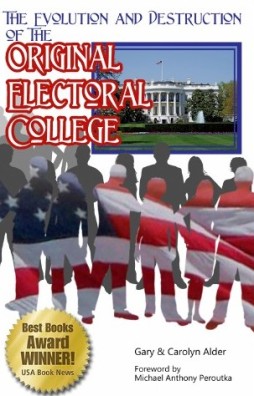Justice is the absence of injustice, it is achieved by securing individual rights.
Key 4 Analysis
Establishing justice is one of the most important purposes of government, as stated in the preamble to the Constitution, “in order to form a more perfect union, establish justice …” Justice does not exist by virtue of itself; rather, justice is the absence of injustice. Just as dark does not exist, but rather is the absence of light. In the same fashion cold does not exist, but is the absence of heat.
When we talk about justice as a department of the government or equate it to apprehending and punishing criminals, we actually redefine the meaning of this abstract concept. The fact is that no amount of punishment of a criminal will make the action taken against his victim just. To make something right after an injustice has been committed would require a restoration of that which was violated. In the absence of the possibility of restoration, restitution to the victim might be possible in some instances. The punishment of the guilty accomplishes neither. The function that punishment serves is to warn the criminal and others who might be inclined to commit crimes, that to violate the rights of others will lead to a forfeiture of their own rights if caught and convicted.
Since the purpose of government is to secure rights, justice demands that before the government can use force to take action against an accused individual, that person would have had evidence brought, witnesses testify, present his defence, and actually be found guilty of the specific charge by a judge or jury. Because the accused might not be guilty, for the government to administer punishment prior to proof of guilt would be injustice on the part of the government. After conviction the penalties imposed will infringe on the criminal’s right to life, liberty, or property by taking his life, putting him in jail, or fining him. Therefore, to avoid injustice on the part of the government, some may go free who are guilty if enough evidence is not found.
A right can be described as a just claim. Specifically when we talk about individual rights we are acknowledging that an individual is free to take action as long as that action does not interfere with the rights of others in their just actions. Individual rights such as life, liberty, property, the opportunity to produce, purchase, pursue personal goals, and happiness are given by God and not by government. The proper role of government is to secure these individual rights. The Founders also called them unalienable or inalienable rights.
Today we are confused about rights. Our modern laws and judicial system have created many new “rights”. For example, what some call a woman’s “right to privacy” can mean that an unborn baby has no right to life if the mother decides that she does not want the baby. Laws allowing same sex marriage and other moral perversions are proposed and sometimes passed, by calling them “rights”.
Entitlements are beliefs that society or government owes us something. The problem is every entitlement comes out of the pocket of somebody else. Nowadays, government teaches that we are entitled to an “equal” education, minimum wage, equal employment with a guaranteed “living wage,” employee benefits, equal health care, equal housing, equal distribution of wealth, etc. Shouldn’t we ask at whose expense? Do employers have equal opportunity to hire or fire who they want? Do they have rights of contract? Do they have opportunity to run their business in a free (from government) market environment? The Founders wanted freedom; a concept we are loosing today. They gave us an opportunity to live life with the ability to pursue happiness or what we call the “American Dream.”
As Dr. W. Cleon Skousen states in his principle of liberty # 7:
“The proper role of government is to protect equal rights, not provide equal things.”
This quote explains this concept well:
You cannot legislate the poor into freedom by legislating the wealthy out of freedom. What one person receives without working for, another person must work for without receiving. The government cannot give to anybody anything that the government does not first take from somebody else. When half of the people get the idea that they do not have to work because the other half is going to take care of them, and when the other half gets the idea that it does no good to work because somebody else is going to get what they work for, that my dear friend, is about the end of any nation. You cannot multiply wealth by dividing it.”
Dr. Adrian Rogers, 1931 to 2005
Justice is the absence of injustice. Laws protect us from criminals and the Constitution protects us from the government.
Quotes
“…a wise and frugal government, which shall restrain men from injuring one another, which shall leave them otherwise free to regulate their own pursuits of industry and improvement, and shall not take from the mouth of labor the bread it has earned. This is the sum of good government.” Thomas Jefferson March 4, 1801 1st Inaugural Address
* * *
“The legitimate powers of government extend to such acts only as are injurious to others. But it does me no injury for my neighbor to say there are twenty gods or no god. It neither picks my pocket, nor breaks my leg.” Thomas Jefferson Notes on Virginia, 1782 Founders constitution Vol. 5 Amend 1 Doc. 40
* * *
“The proper role of government it to protect equal rights, not provide equal things.” Dr. W. Cleon Skousen Principle of Liberty #7
* * *
The Sacred Rights of mankind are not to be rummaged from among old parchments or musty records. They are written as with a sunbeam, in the whole volume of human nature, by the Hand of Divinity itself, and can never be erased or obscured by mortal power. Alexander Hamilton The Farmer Refuted 1775
* * *
Among the natural rights of the colonists are these: first, a right to life; secondly, to liberty; thirdly to property; together with the right to support and defend them in the best manner they can. Samuel Adams
* * *
We hold these truths to be self-evident that all men are created equal, that they are endowed by their Creator with certain unalienable Rights, that among these are Life, Liberty, & the Pursuit of Happiness–that to secure these Rights, Governments are instituted among Men deriving their just Powers from the Consent of the Governed, that whenever any Form of Government becomes destructive of these Ends, it is the Right of the People to alter or abolish it and institute new Government, laying its Foundation on such Principles, and organizing its Powers in such Form, as to them shall seem most likely to affect their Safety and Happiness. Thomas Jefferson Declaration of Independence
* * *
Since the protection of individual rights is the only proper purpose of a government, it is the only proper subject of legislation: all laws must be based on individual rights and aimed at their protection. All laws must be objective (and objectively justifiable): men must know clearly, and in advance of taking an action, what the law forbids them to do (and why), what constitutes a crime and what penalty they will incur if they commit.
The source of the government’s authority is “the consent of the governed.” This means that the government is not the ruler, but the servant or agent of the citizens,; it means that the government as such has no rights except the rights delegated to it by the citizens for a specific purpose.” Ayn Rand The Virtue of Selfishness, The Nature of Government pg. 128,129
* * *
There are two potential violators of man’s rights; the criminals and the government. The great achievement of the United States was to draw a distinction between these two–by forbidding to the second the legalized version on the activities of the first. . . . the government was set to protect man from criminals–and the Constitution was written to protect man from the government. The Bill of Rights was not directed against private citizens, but against the government–as an explicit declaration that individual rights supersede any public or social power. Ayn Rand The Virtue of Selfishness, Man’s Rights, pp. 111,112
* * *
If a society is to be free, its government has to be controlled. Ayn Rand
* * *
“No man is entitled to the blessings of freedom unless he be vigilant in its preservation.” General Douglas MacArthur WWII
* * *


